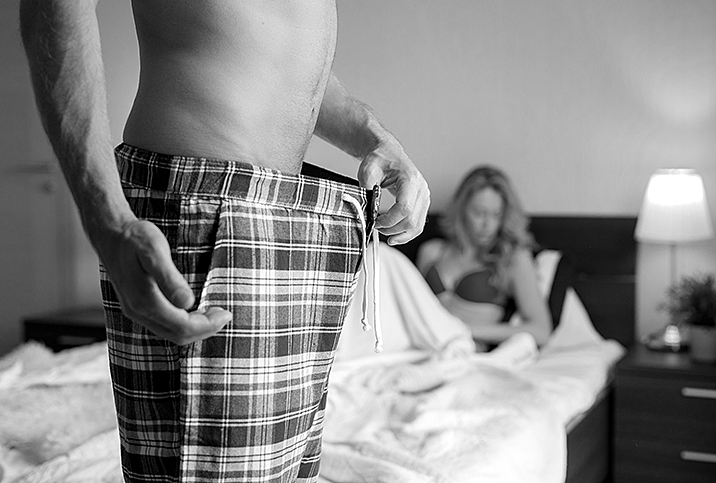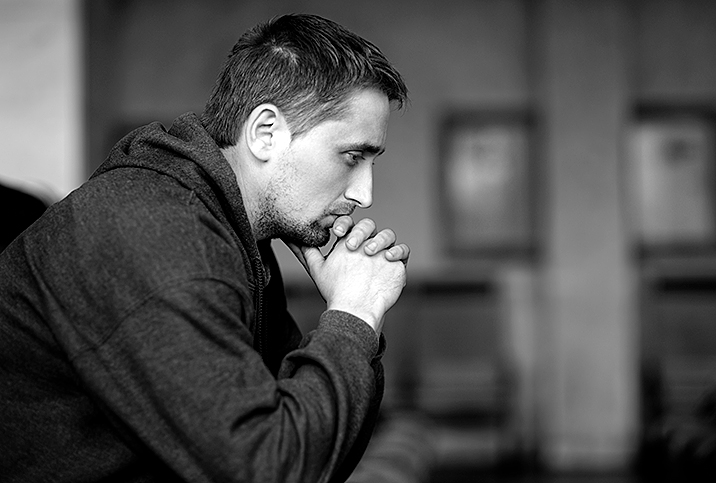We Have Questions: ED in Younger Men

The occasional "whiskey dick" episode might feel life-altering in the moment, but it's not necessarily a cause for concern. On the other hand, consistent or recurring sexual dysfunction can cause significant stress and may signal a serious issue.
Erectile dysfunction (ED) can be particularly troubling for young men, especially when they are otherwise healthy.
ED can feel isolating, but it's a common problem. About 30 million men in the United States experience ED, according to a review in Current Opinion in Nephrology and Hypertension. Most sufferers are older than 40, with about 40 percent of 40- to 50-year-olds experiencing some degree of the disorder.
However, many younger people are also affected by ED. A 2004 study published in Current Medical Research and Opinion indicated about 8 percent of people with penises ages 20 to 29 and 11 percent between ages 30 and 39 are affected. Another study, published in 2013 in the Journal of Sexual Medicine, found 26 percent of total ED cases occur in people ages 40 and younger.
Erections aren't as simple as they seem. Achieving and maintaining one involves a complex network of psychological, physiological and physical systems working in unison. When any one of these is off-kilter, it can be challenging—or, at times, feel impossible—to get and stay hard.
Fortunately, most ED is treatable. A number of people find relief and regain their confidence without needing any special equipment or expensive surgery.
Michael Werner, M.D., is a board-certified urologist and the medical director and founder of Maze Men's Sexual & Reproductive Health in New York. We talked to Werner about the prevalence of ED in younger people, the possible causes and the available treatment options.
Some people experience occasional erectile difficulties, but when does a problem become a 'dysfunction'?
Werner: There's no real, official definition for this. But if it gets to the point where they are worried they're not going to be able to get and maintain an erection—which is sort of the definition of having ED—so if it gets to the point where they lose their confidence, and it's happening with some regularity or it's inhibiting their ability to have sex because they're concerned about it, that's when I would say there's a dysfunction.
How prevalent is ED in general? How prevalent is it in different age groups?
It seems to basically go by decade, so by the time men are 40, it's 40 percent; 50, it's 50 percent; 60, 60 percent. That's a very good rule of thumb.
What are the primary causes of ED in people younger than 35 or 40?
For 90 percent of the men below 35, it's primarily psychogenic. But then, of course, there's 10 percent for whom it is physical.
It's amazing how powerful the brain is in controlling the penis. We think of it as an automatic response that, when you're younger, it's like nothing can get in the way of an erection. But anxiety can really have a negative effect on erections. Some young men come in and are so anxious, they need the strongest dose of injections to get a good erection. Over time, when they gain confidence, some of them end up needing nothing. But their brain has gotten in the way so effectively of them getting an erection.
Many men feel a little less inhibited when they've been drinking, but that can have a negative effect on the erection and particularly ejaculation.
Also, it's about who they're having sex with and what the situation is. Some men really don't do well in the first [interaction]. They like to be much more comfortable with someone before they have sex. Some people tend to rush into having sex very early. Sometimes that puts stress on people because you're being judged more by your performance than by who you are. There's a multitude of reasons.
Of course, there can be trauma, which can be surgical or other, like motor vehicle accidents or something else that affects the perineum.
In terms of overall medical conditions, the best way to think about it is anything that affects your heart affects your penis. Since the blood vessels [in the penis] are about one-tenth the diameter, that will often affect the penis before it affects the heart. The most important one is diabetes, but hypertension, hypercholesterolemia, smoking, obesity and lack of exercise could all cause it. Those are cardiovascular reasons. There's also hormonal. We check men's testosterone and the thyroid and that they don't have a benign pituitary adenoma.
Are those causes similar to or different than causes for older people?
The main causes in younger people are the same as in older people; it's just that it's skewed more toward psychological. It can be cardiovascular, psychological, endocrine or neurologic.
If you're a happily married 62-year-old and slowly getting erection issues and nothing has really happened, you will think it's more physical. If you're 52 and your wife has an affair and you're devastated, and now you're out there dating and you were fine before, that would make you think, even though you're in your 50s, it's mostly a psychological component.
What are some nonmedical strategies, such as diet and lifestyle changes, that young men can try to prevent or diminish ED?
Anything good for your heart will be good for your penis; so, good cardiovascular exercise, watching your diet, and avoiding bad habits like smoking and alcohol intake.
What medical interventions are available?
We usually start with the pills. There are three main ones out there. Viagra and Cialis, which are generic at this point, so sildenafil and tadalafil, and there's another one called avanafil. Sometimes men will come in and say they've failed on the pill with other doctors. It's really important they take them correctly. For example, Viagra has to be taken on an empty stomach or it doesn't work. A lot of men will say, "I tried Viagra and it didn't work." Well, if you had food, it's not going to work. Or, for example, Cialis, which is most men's favorite. That takes two to four hours to work but you can take it with food. If you take it and then try to have intercourse or intimacy 20 minutes later, it will not have kicked in. So part of my job is to make sure people take it correctly.
That's the first thing, but then for a lot of people, the pills do not work. At that point, we do injections. It sounds very draconian, the idea of putting a needle in your penis. I just gave a lecture to ultra-Orthodox Jews and they're like, "Oh, my God, no one would ever do that." But it doesn't hurt. It feels like flicking your penis with a rubber band. And they get amazing erections because it puts the medicine exactly where it's supposed to be.
In fact, that's what a lot of the men in porn use. Most men feel so badly about their performance because they're comparing themselves to men in porn. But that gives them amazing erections, and then, of course, if it's psychogenic, sometimes they get such good erections they don't need [the medication] anymore.
If nothing is working, at that point, there are surgeries and implants. Of course, we don't rush to do that. Think about it as you wouldn't rush to give someone an artificial knee. We almost never have to do that.


















